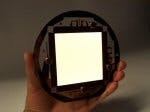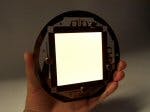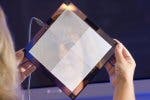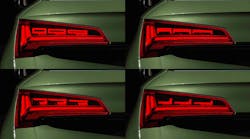The 45-month OLLA project started on 1 October 2004 with a budget of EUR 20 million, of which EUR 12 million came from the European Union. Philips, Osram Opto Semiconductors, Siemens, Novaled and Fraunhofer IPMS will continue the development of OLED lighting technology in a follow-up project entitled OLED100.eu. The project aims to increase the efficiency, lifetime and size of OLEDs.
Within OLLA, 24 partners from 8 European countries have been working closely together to develop OLED technology for lighting purposes with the goal to reach an efficacy of 50 lm/W combined with a lifetime of over 10,000 hours at 1000 cd/m2 initial brightness.
The partners reached the project targets in efficacy, color rendering and brightness, while the lifetime of the Novaled device exceeded the target value by one order of magnitude.
“The Novaled PIN technology has the potential to further improve the power efficiency. It’s in line with the technology roadmap that in the near future some 100 lm/W OLEDs will be achievable,” adds Martin Vehse from Novaled.
“Collecting all light of the device in a laboratory set-up with a macro extractor, we measure even more than 80 lm/W,” comments Volker van Elsbergen of Philips Research. "This shows that one of the keys to higher efficiencies will be better light out-coupling technologies.”
Besides the record values listed above, the OLLA project delivered the first large sized ITO-free OLEDs, the first large-area printed OLEDs and several ICT demonstrators. All demonstrators were on show on June 12 at a public event in Eindhoven.
OLLA Industrial Partners:
• Aixtron AG, Aachen, Germany
• Merck KGaA, Frankfurt, Germany
• H.C. Starck GmbH, Germany
• Novaled AG, Dresden, Germany
• Osram Opto Semiconductors GmbH, Regensburg, Germany
• Philips Electronics Nederland BV, Eindhoven, the Netherlands
• Philips Lighting GmbH, Aachen, Germany
• Philips GmbH Forschungslaboratorien, Aachen, Germany
• Sensient Imaging Technologies GmbH, Wolfen, Germany
• Siemens AG, Erlangen, Germany
Universities:
• Ecole Polytechnique Fédérale de Lausanne (EPFL), Switzerland
• Katholieke Universiteit Leuven (KUL), Belgium
• Rijksuniversiteit Groningen (RUG), the Netherlands
• Institut für Angewandte Photophysik (IAPP), Technische Universität Dresden, Germany
• Universität Kassel, Germany
• Universiteit Gent, Belgium
Research Institutes:
• Centre National de la Recherche Scientifique - Institut des Matériaux Jean Rouxel de Nantes (CNRS-IMN), France
• Centre National de la Recherche Scientifique - Laboratoire de Chimie de Coordination du CNR (CNRS-LCC), France
• Consiglio Nazionale delle Ricerche Bologna (CNR-ISOF), Italy
• Consiglio Nazionale delle Ricerche Lecce (CNR-IFNM), Italy
• Fraunhofer Institute for Photonic MicroSystems (IPMS), Germany
• Institute of Physical Chemistry of the Polish Academy of Science, Poland
• Inter-universitair Micro-Electronica Centrum (IMEC), Belgium
• VTT Technical Research Centre, Finland








